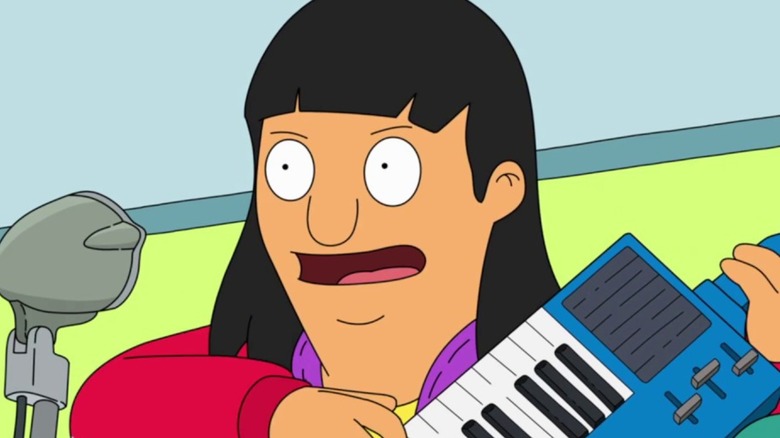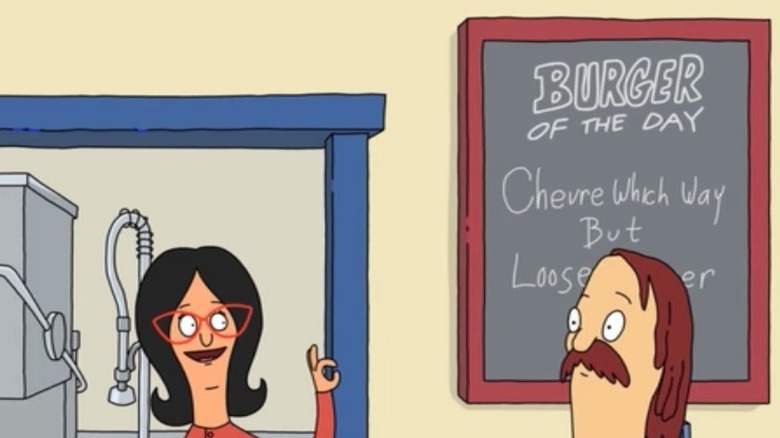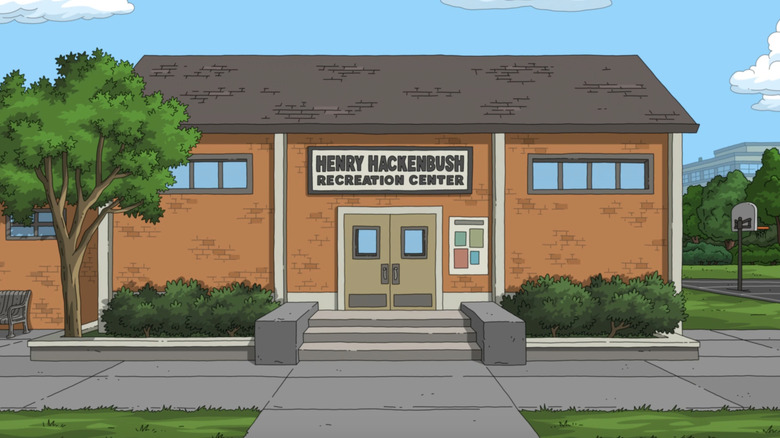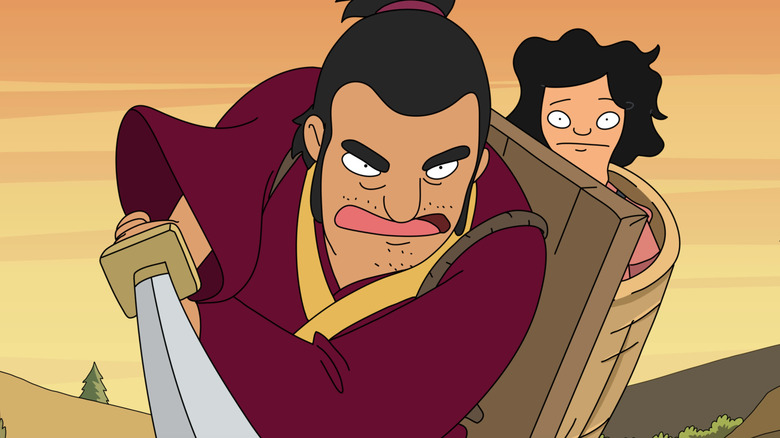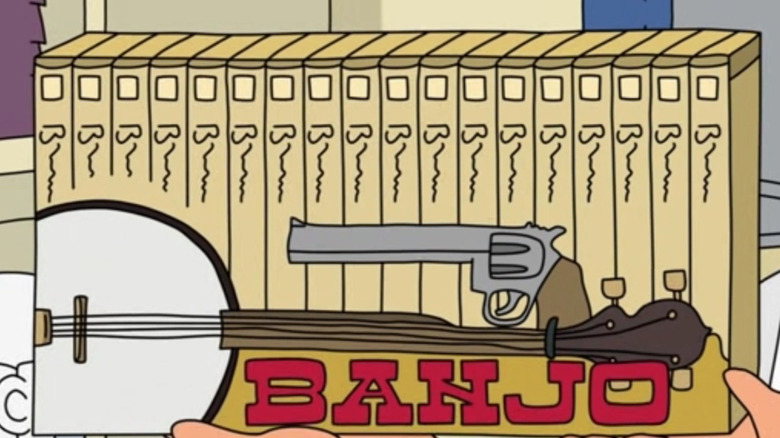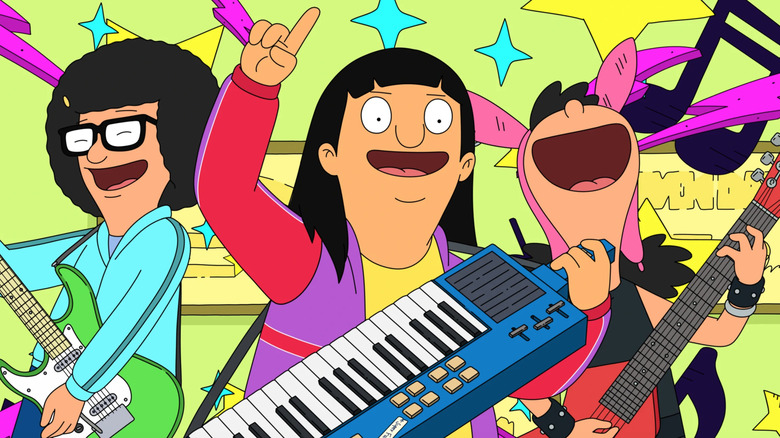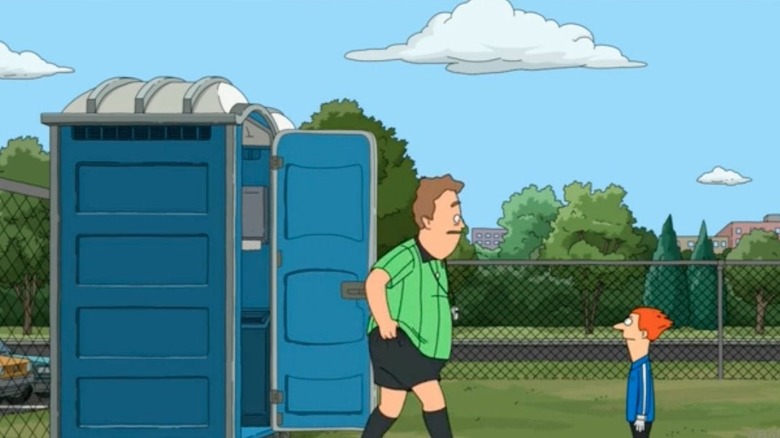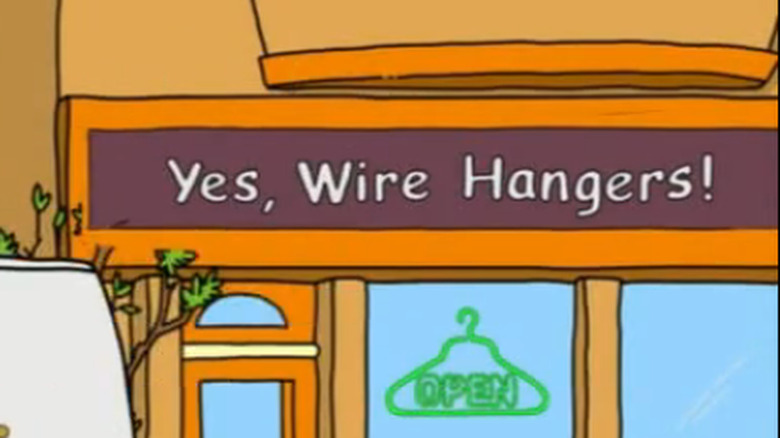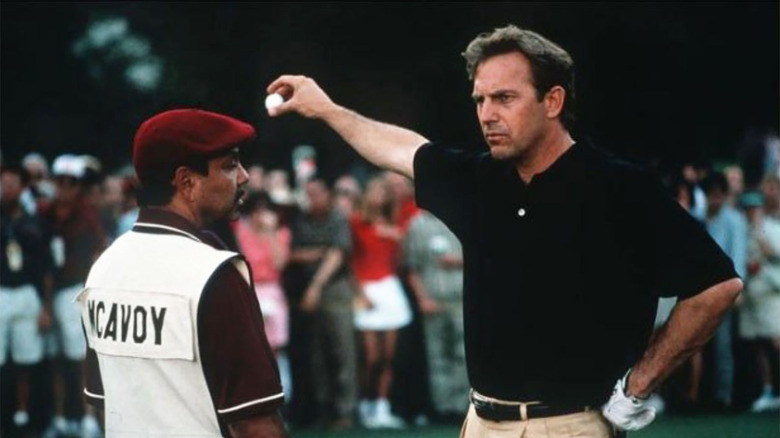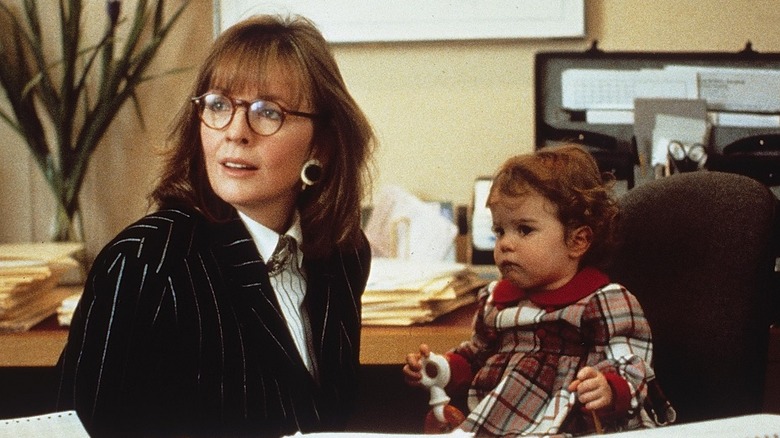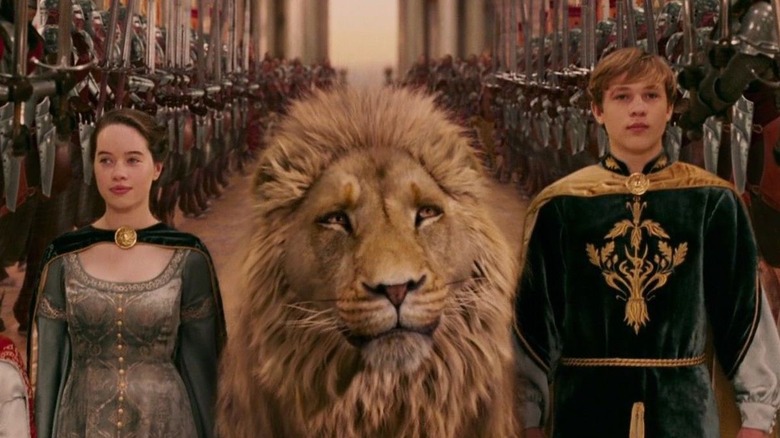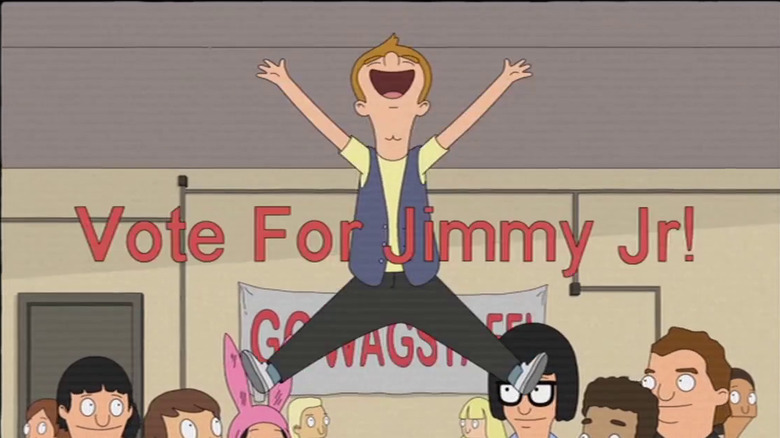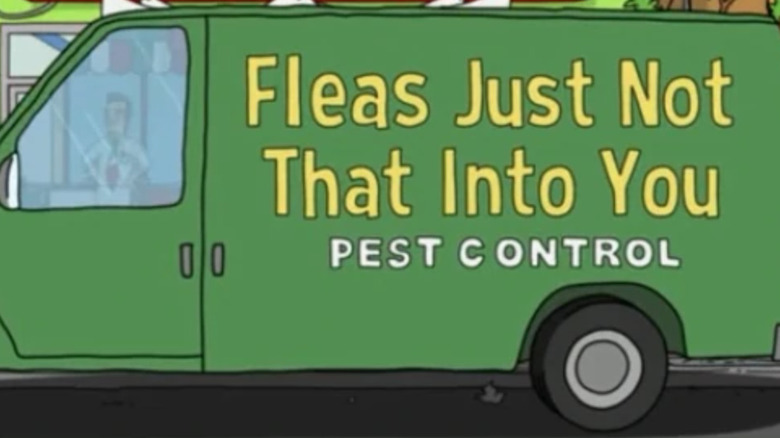The Most Obscure References In Bob's Burgers
"Bob's Burgers" has joined the ranks of "The Simpsons" and "Family Guy" — adult animated series that FOX will keep ordering new episodes for seemingly forever. However, while few would disagree that "The Simpsons" and "Family Guy" both grew stale over time, "Bob's Burgers" has stayed consistently good for a much longer time than either of its predecessors have. Who knows how long that will last, especially with creator Loren Bouchard splitting his time between "Bob's Burgers," "Central Park," and "The Great North," but for now, the good-natured family sitcom remains a reliable fountain of laughs every Sunday night.
The humor in "Bob's Burgers" is primarily character-driven, and as such, enjoying it is not quite as heavily reliant upon having a wealth of topical and nostalgic pop culture knowledge as other adult cartoons can be. However, that doesn't mean those who come to the show with such knowledge on hand won't find plenty of reward for their wide frames of reference. Jokes about movies, TV, literature, and history are sprinkled throughout the show, and with over 225 episodes released so far, that adds up to a lot of trivia to dig into. The show's still hilarious without knowing all of this trivia, but getting the various obscure references only makes the experience of watching (or re-watching) the episodes even more entertaining. Here's a guide to some of the most obscure references in "Bob's Burgers" history.
Burgers of the Day
Almost every episode of "Bob's Burgers" contains at least one unique Burger of the Day, with pun-heavy names based on whatever special toppings are being used. These joke burgers are such a beloved part of the series that they even inspired a real cookbook, and with hundreds of burger names, some of the puns can get pretty obscure.
Some examples of headscratchers among the burger names include the Chèvre Which Way But Loose Burger from Season 1's "Sexy Dance Fighting" (based on the Clint Eastwood-with-an-orangutan movie "Every Which Way But Loose"), the A Good Manchego is Hard to Find Burger from Season 5's "Late Afternoon in the Garden of Bob and Louise" (based on the Flannery O'Connor short story "A Good Man is Hard to Find"), and The Sneakin' Celery Down the Alley Burger from Season 8's "As I Walk Through the Alley of the Shadow of Ramps" (based on Robert Palmer's solo album "Sneakin' Sally Through the Alley"). Perhaps the deepest cut Burger of the Day isn't from a "Bob's Burgers" episode at all but from the "Archer" crossover episode "Fugue and Riffs," which features the Thomas Elphinstone Hambledurger with Manning Coleslaw (based on the fictional spy Thomas Elphinstone Hambledon from the novels by author Manning Coles).
Someone really loves the Marx Brothers
Marx Brothers references are built into the setting of "Bob's Burgers." Tina, Gene, and Louise are all students at Wagstaff School, which is not a reference to Randy and Cheese Wagstaff from "The Wire" as some have incorrectly assumed but instead takes its name from Professor Quincy Adams Wagstaff, Groucho Marx's character in the 1932 comedy "Horse Feathers." Wagstaff serves both elementary and middle school students, but should Tina ever graduate the eighth grade, she might find herself attending Huxley High School, the town's secondary education location which is also a reference to "Horse Feathers" — in that film, Professor Wagstaff is the president of Huxley College.
Schools aren't the only locations in "Bob's Burgers"' world bearing Marx Brothers references. Two different locations are named after Groucho's character Dr. Hackenbush from the 1937 film "A Day at the Races": the Henry Hackenbush Recreation Center, where Linda teaches her class in the Season 2 episode "Synchronized Swimming," and Hackenbush Downs, the race track Teddy and the kids visit in the Season 4 episode "I Get Psy-chic Out of You." Clearly, the writers love their Marx Brothers movies.
Bob and Louise's favorite samurai film series
Season 5's "Hawk & Chick," in which Bob and Louise put together a film festival to reunite the estranged father and daughter who once starred in the "Hawk and Chick" samurai movie series, is among the sweetest half-hours of "Bob's Burgers." The fictional 14-film series at the center of this episode's storyline is inspired by various classic Japanese movies, but most directly the "Lone Wolf and Cub" series. Based on the manga written by Kazuo Koike and illustrated by Goseki Kojima, the six-film "Lone Wolf and Cub" series follows an assassin who travels with across Edo-period Japan with his three-year-old son.
The characters of Hawk and Chick are parallels to Ogami and Daigoro of "Lone Wolf and Club." Season 10's follow-up episode, "The Hawkening: Look Who's Hawking Now!" went so far as to spoof a banned episode from the 1973 "Lone Wolf and Cub" TV series. However, where "Lone Wolf and Cub" was relatively realistic until its zombie-filled final film, "White Heaven in Hell," the "Hawk and Chick" series seems to tend more towards pure fantasy with kaiju-style monsters.
Bob and Gene's Western addiction
Bob and Louise might bond over samurai monster movies, but the youngest Belcher can't stand her dad's other favorite extremely long movie series. In the Season 1 episode "Spaghetti Western and Meatballs," Bob gets Gene hooked on the spaghetti Western series "Banjo," but while father and son bond over it, Louise gets jealous. "Banjo" is a clear play on "Django," the 1966 Sergio Corbucci film about a Civil War soldier played by Franco Nero. "Django" had one official sequel in 1987, "Django Strikes Again," but due to loose copyright laws in Italy at the time, the character appeared in at least 30 unofficial sequels, with countless more Westerns borrowing the name "Django" even if they didn't use the character.
The most famous film to borrow the Django name has to be Quentin Tarantino's Oscar-winning blockbuster "Django Unchained." It's worth noting that "Django Unchained" was released in 2012, over a year after "Spaghetti Western and Meatballs" first aired, so when "Bob's Burgers" introduced its Django parody, the reference was a more obscure one than it is now.
Fart School for the Gifted
"Bob's Burgers" has regularly borrowed from the "Treehouse of Horror" formula of "The Simpsons," with anthology episodes in which the characters tell three fantasy stories. Usually these stories tend to insert the Belchers into the plots of popular movies. In Season 4's "The Frond Files," the Belcher kids present their unconventional reports on why they love their school. Louise's report, "Why I Love Wagstaff," is a "Terminator 2: Judgment Day" parody, while Tina's "A Tale of Horror" is a work of "erotic friend-fiction" inspired by "Night of the Living Dead."
Gene's segment, "Fart School for the Gifted," borrows the plot of a slightly less well-known movie, The Ramones' 1979 musical "Rock 'n' Roll High School." Both stories involve students rebelling against their teachers to play music and end with them ultimately destroying their school. In Gene's version, his song is a keyboard piece about how "farts will set you free" that ends with a fart sound so loud it destroys Wagstaff.
A Home Movies reunion episode
Before Loren Bouchard created "Bob's Burgers," he and Brendon Small co-created the shorter-lived animated sitcom "Home Movies." The series about an eight-year-old filmmaker (named after and voiced by Brendon Small) lasted just six episodes on UPN in 1999, but was brought back for three more seasons on Adult Swim from 2001-2004. "Home Movies"' breakout character, Couch McGuirk, was voiced by H. John Benjamin, speaking in a very similar voice to what he'd later use for Bob Belcher, Sterling Archer, and basically every other character he's played.
"Bob's Burgers" gave Bob Belcher and Coach McGuirk even more similarities than their distinctive vocal deliveries in the Season 8 episode "The Hurt Soccer." This episode involves Bob becoming the coach for Louise's failing soccer team. The episode, directed by former "Home Movies" animator Damon Wong, doesn't stop there — the goalie Mara is designed very similarly to "Home Movies"' character Melissa Robbins and is also voiced by Melissa Galsky, while another minor character clearly resembles Brendon Small's "Home Movies" persona (though he doesn't appear in the episode, Small has voiced an animal control guy in previous "Bob's Burgers" seasons). The game's referee also bears a resemblance to Coach McGuirk.
The store next door
Like Bart's chalkboard writing and the couch gags in the opening of "The Simpsons," every episode of "Bob's Burgers" features a different store next door to the Belchers' restaurant during the opening theme. Usually these businesses are closed and the space is once again for rent when the episode actually starts, though occasionally the ever-changing stores will actually play a role on the episode's story.
Examples of references worked into the store names include "Yes, Wire Hangers!" from Season 2's "Beefsquatch" (referencing the "No wire hangers!" line from "Mommie Dearest"), Johnny Razor's Totally Normal Candy Score from Season 4's "Fort Night" (referencing urban legends born from the '80s product tampering scares), Sag Me to Hell Bra Boutique from Season 7's "Tina Witch" (referencing the Sam Raimi horror film "Drag Me to Hell"), and I Only Have Rab-Eyes For You Rabbinical Dating Service from Season 10's "Poops!... I Didn't Do It Again (referencing the song "I Only Have Eyes For You").
Bob hates a movie he's never seen
In the Season 2 episode "Moody Foodie," Bob's restaurant gets a scathing review from a critic known as the Moody Foodie (voiced by Patton Oswalt). Bob obsessively tries to force the Moody Foodie to redo his review, tying him up and inviting other restauranteurs who've been panned to also seek revenge, but Bob's hypocrisy is brought to light when a deliveryman gives him a DVD of the 1996 Kevin Costner golf romcom "Tin Cup." Bob calls "Tin Cup" a "bad movie" based on reading a negative review, despite having never seen it. Others who have seen the movie object to this descriptor, and this experience makes Bob realizes that he should get over his hurt feelings from the review since the Moody Foodie was just doing his job as a critic.
Whichever critic Bob was reading certainly had a harsher opinion on "Tin Cup" than the norm. The movie actually has a 73% fresh rating from critics on Rotten Tomatoes, so most weren't nearly so negative. For his performance in "Tin Cup," Costner received a Golden Globe nomination for Best Actor – Motion Picture Musical or Comedy.
Linda wants to follow in Diane Keaton's footsteps
In the Season 11 episode "Mr. Lonely Farts," Gene is stuck at home alone while Bob, Louise, and Teddy shop for restaurant supplies and Linda and Tina go to the shoe store. It's in the latter subplot where Linda makes one of the series' most out-of-left-field movie references. Easily impressed by trying on full-priced shoes that match, Linda says she feels like a New York business woman and, in attempting to act the part, says, "Hey Mister Big Boss, I don't need this job. I'm going to quit and move to Vermont and make baby applesauce."
The career path Linda is describing matches that of Diane Keaton's character J.C. Wiatt from the 1987 romcom "Baby Boom." Directed by Charles Shyer and co-written by Nancy Meyers, "Baby Boom" was a modest hit, earning two Golden Globe nominations and a TV spinoff that lasted one season, but today, it's one of the least recognized of the many '80s pop culture references in the "Bob's Burgers" canon.
Who wrote The Chronicles of Narnia?
Gene's pop culture knowledge is vast and eclectic for someone his age, but that doesn't mean it doesn't get extremely confused from time to time. One humorous example of this confusion can be found in the show's second episode, "Crawl Space," in which Bob gets stuck in the walls while trying to repair a leak in the roof. While Bob is stuck, Gene asks him, "Do you see a lion, a witch, or a wardrobe?" When Bob asks why he's asking, Gene replies, "It's a book... by Salman Rushdie."
As Bob knows, "The Lion, the Witch and the Wardrobe" was not written by "The Satanic Verses" author Salman Rushdie, but by C.S. Lewis. Bob correcting him, however, doesn't stop Gene from passionately arguing that Rushdie is the actual author of "The Chronicles of Narnia." Needless to say, those books would have been very different if Gene was correct.
Jimmy Jr.'s campaign ads
Jimmy Jr. runs for class president in the Season 5 episode "The Millie-churian Candidate," and the videos Tina and Louise make for his campaign are parodies of other infamous advertisements. The first ad is an awkward song-and-dance number set to a tune that sounds an awful lot like the one from Dr. Pepper's "Be a Pepper" commercials in the late '70s and early '80s. The ad ends on a scream reminiscent of the one that infamously ended Howard Dean's 2004 presidential campaign.
After this attempt as a positive ad goes over poorly, Louise decides to go negative for Jimmy Jr.'s second ad, an homage to Hillary Clinton's "It's 3 AM" spot from the 2008 Democratic presidential primary. Whereas Clinton's ad played up the former Senator's experience to assure people she could be trusted in an emergency, only implicitly putting down her opponents, the Jimmy Jr. campaign version leans much more directly into named attacks on fellow candidate Millie.
Pest control companies
Starting in Season 2, the stores next door were joined by another constantly rotating source of puns in the "Bob's Burgers" opening sequence: different company names on the pest control vehicle that arrives at the restaurant between its Grand Re-Opening and Grand Re-Re-Opening to exterminate whatever pest happens to be plaguing Bob's Burgers. As with the stores next door and the burgers of the day, there are enough jokes to work with in this category that they could very well fill their own lists.
Some of these companies include Jake and the Ratman in Season 3's "The Kids Run the Restaurant" (referencing the TV show "Jake and the Fatman"), The Mice Storm in Season 6's Nice-Capades (referencing the book and movie "The Ice Storm"), Fleas Just Not That Into You in Season 9's "Just One of the Boyz 4 Now for Now" (referencing the movie "He's Just Not That Into You"), and Vermin on the Verge of a Nervous Breakdown in Season 11's "The Terminalator II: Terminals of Endearment" (referencing the movie "Women on the Verge of a Nervous Breakdown").
